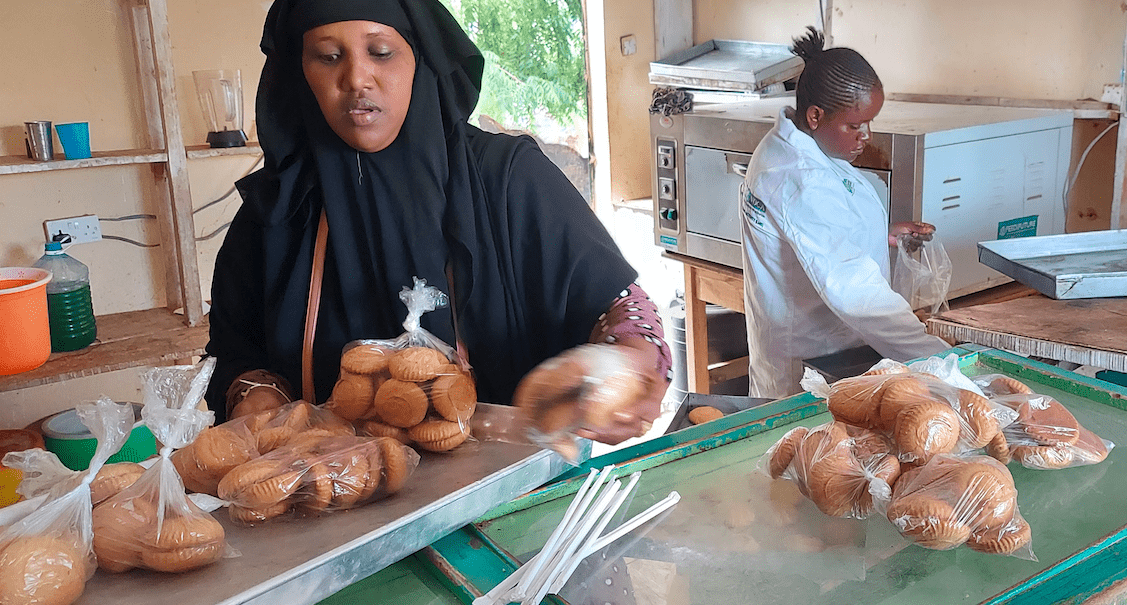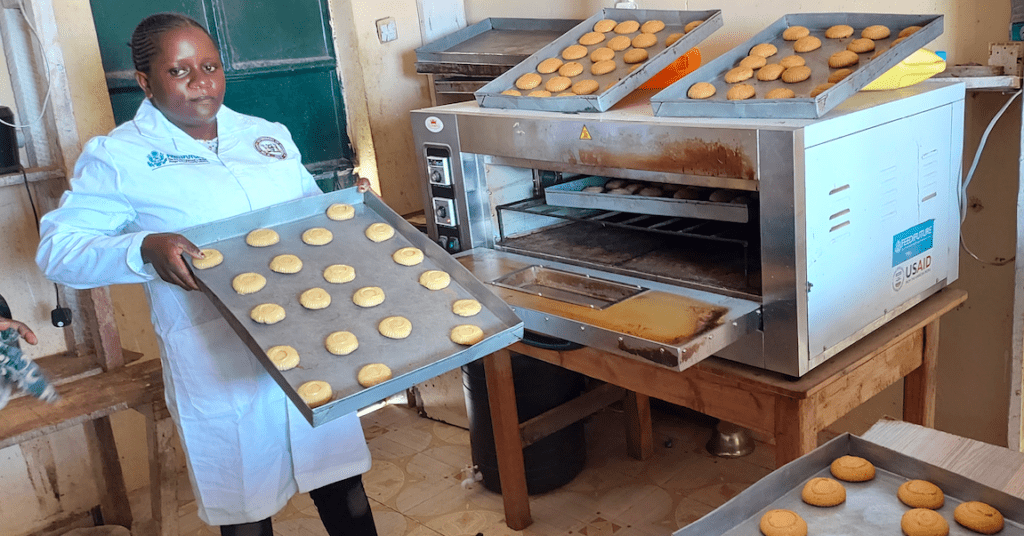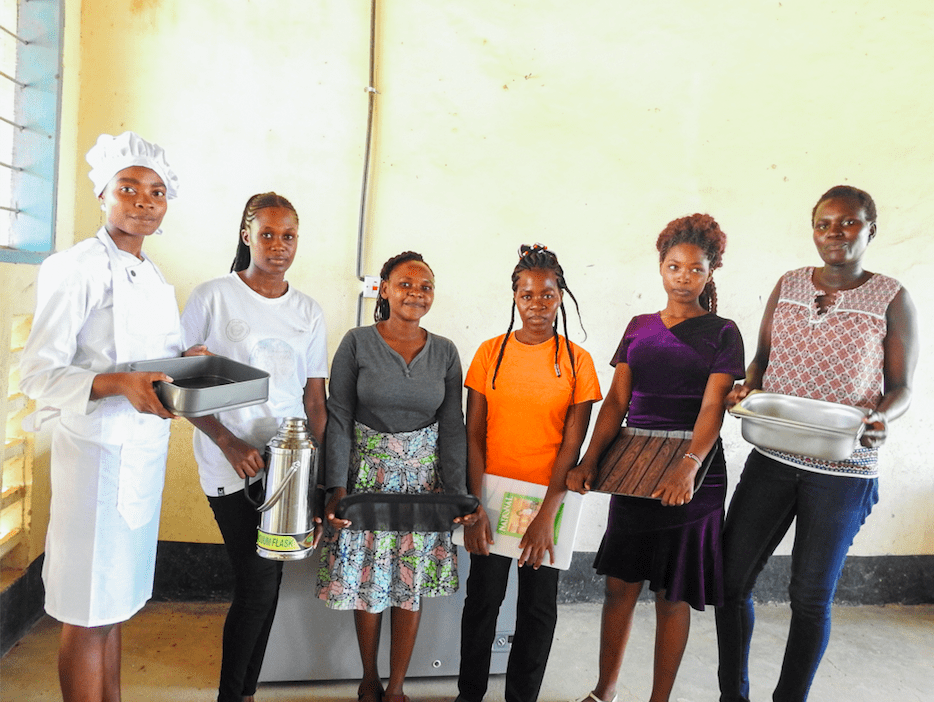
Abshira Ahmed, an entrepreneur bakery owner, strengthened her business thanks to a grant for much-needed new equipment.
Ever since she was a child, Abshira Ahmed baked cookies and donuts with her mother and grandmother and sold them during special occasions, such as Eid al-Fitr. Therefore, it was only natural that she picked up the trade and, in 2019, opened her business, Abshira Vitamin Cake Bakery, at the Garissa Livestock Market.
Abshira lives in the Garissa Township Sub-County of Garissa County in Northern Kenya. Of the 841,353 people living there, 95 percent are ethnic Somali whose lifestyle is defined by livestock keeping and nomadic pastoralism. The county is semi-arid with high temperatures averaging 36 degrees Celsius. The Garissa Livestock Market, built in 2018, is the largest in East Africa, attracting traders from as far as 250 kilometers away with approximately 5,000 cows and 3,000 goats. Abshira has a business stall at the market, where she has gained exposure for her pastries among livestock traders, supermarket owners, and retailers. To meet her market demands, she needed to upgrade her baking equipment.

Grant Helps Entrepreneur Modernize Equipment and Dramatically Increase Production
In 2021, the Feed the Future Kenya Livestock Market Systems Activity advertised grants for local businesses. Abshira applied for the grant and, after a feasibility assessment, received $2,363 to commercialize her business. She purchased modern, commercial baking equipment, including an oven with a capacity of 25 kilograms and a donut-making machine. She also invested in a two-door, no-frost electric refrigerator and a professional juice blender. This allowed Abshira to increase her production from 100 to 1,000 cookies per day. At the same time, she employed an assistant to prepare the batter and dough as she ran other aspects of the business. Soon, she earned approximately $30 a day with profits of up to $120 a month.
But that was not the only change. In 2021, the Northeastern National Polytechnic in Garissa County introduced a new course in food and beverage management. However, the school lacked the budget to purchase commercial baking equipment. To bridge the gap, the Activity linked the school with Abshira Vitamin Cake. Six students visited the bakery and learned how to bake cookies, donuts, cupcakes, and bread rolls — new skills that boosted their entrepreneurial goals in baking.
“Before we went to Abshira’s, our classes were purely theoretical. The practical classes we held at her bakery helped us to grasp the concepts better and allowed us to carry the knowledge acquired back to our classrooms. Those lessons at Abshira’s made the class a reality, and it began to make sense.”
— Rael Awuor, student who attended practical lessons at Abshira’s bakery
Through this connection, Stephen Otieno, a tutor leading the course, trained Abshira to improve her baking techniques resulting in softer and tastier pastries. Before the interaction, Abshira only baked small-sized pastries. The new relationship enabled her to venture into the business of baking wedding cakes. She also learned how to decorate pastries, giving her a competitive edge within local supermarkets.
“Before I interacted with Mr. Otieno, I had all the necessary equipment and was making good pastries. However, since he spent time training me, my cookies have become the market’s favorites, and, despite the drought that is eating into my profits, my products are in demand. Now I’m looking for ways to move the pastries closer to the traders for increased market penetration.”
— Abshira Ahmed, owner of Abshira Vitamin Cake Bakery

LMS continues to anchor Abshira’s business through mentorship on the various aspects of business operations.
Activity Encourages Alternative Livelihoods
To help local businesses expand sustainably, USAID, through the Activity has invested in over 300 micro, small-, and medium-sized enterprises in Northern Kenya. These enterprises engage in non-livestock ventures, such as honey production and crop production. These alternative sources of livelihood provide reliable income for small-business holders and relieve the pressure on the natural grasslands in a community whose main source of livelihood is pastoralism.
About the Feed the Future Kenya Livestock Market Systems Activity
This is a United States Agency for International Development (USAID)–funded program through the U.S. government’s Feed the Future Initiative that addresses global hunger, food security, and agricultural livelihoods. The Activity aims to expand and diversify viable economic opportunities, while strengthening community capacities for resilience and growth in five counties of Northern Kenya: Garissa, Isiolo, Marsabit, Turkana, and Wajir.
Learn more about this Activity here.
Learn more about our efforts in Kenya here.








